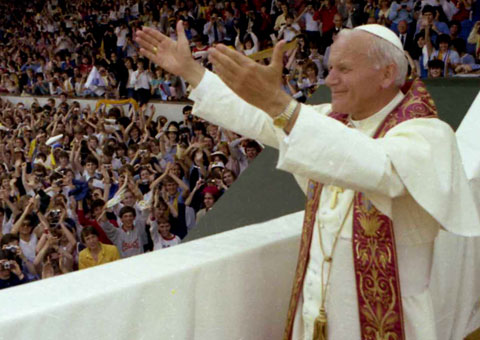
22 January 2001
Newman was born in troubled times which knew not only political and military upheaval but also turbulence of soul. Old certitudes were shaken, and believers were faced with the threat of rationalism on the one hand and fideism on the other. Rationalism brought with it a rejection of both authority and transcendence, while fideism turned from the challenges of history and the tasks of this world to a distorted dependence upon authority and the supernatural. In such a world, Newman came eventually to a remarkable synthesis of faith and reason which were for him “like two wings on which the human spirit rises to the contemplation of truth” (Fides et ratio, Introduction). It was the passionate contemplation of truth which also led him to a liberating acceptance of the authority which has its roots in Christ, and to the sense of the supernatural which opens the human mind and heart to the full range of possibilities revealed in Christ. “Lead kindly light amid the encircling gloom, lead Thou me on”, Newman wrote in The Pillar of the Cloud; and for him Christ was the light at the heart of every kind of darkness. For his tomb he chose the inscription: Ex umbris et imaginibus in veritatem; and it was clear at the end of his life’s journey that Christ was the truth he had found.
18 June 1990
Four extracts from Pope John Paul II’s letter to Archbishop Couve de Murville:
Newman’s long life shows him to have been an ardent disciple of truth. The unfolding of his career confirms the singleheartedness of his aims as expressed in the following words which he made his own: “My desire hath been to have Truth for my chiefest friend, and no enemy but error” (Lectures on the Prophetical Office of the Church, London,1837). In periods of trial and suffering he persevered with confidence, knowing that time was on the side of truth.
His doctrine on conscience, like his teaching in general, is subtle and whole, and ought not to be oversimplified in its presentation. He sets out from the basic affirmation that conscience is not simply a sense of propriety, self-respect or good taste, formed by general culture, education and social customs. Rather it is the echo of God’s voice within the heart of man, the pulse of the divine law beating within each person as a standard of right and wrong, with an unquestionable authority. The inner light of conscience puts a person in contact with the reality of a personal God … Moreover, according to Newman, religious obedience to this inner voice puts a person on the look-out for a divine revelation, leads from light to light and ultimately to Christian faith.
By following the light of his conscience, Newman made a journey of faith which he has described with force and clarity in his writings. After spending the first half of his life in generous service to the Church of England which he deeply loved, he spent the second half in the service of the Catholic Church, showing a like sincerity and unflinching loyalty. The thoughts and convictions which gave rise to his conversion found their roots and inspiration in the writings of the Fathers of the Church, which are the common patrimony of all Christians. I have often urged that Christians need to rediscover together their common heritage of faith if we are to see the reintegration of Christ’s followers in the unity for which he prayed. This is a process that can be remarkably furthered by attention to the work of Newman.
Newman’s remarkable life, void of sham and ambition, but steeped in a prayerful communion with the Unseen, while it remained alive to the problems of his age in Church and society, continues to inspire, to uplift and to enlighten.
27 April 1990
Two extracts from a message to Newman scholars:
With letters of spiritual direction and counsel Newman helped countless others along the path of the truth he himself had found and which filled him with so much joy. Newman’s influence in this sense has increased over the past hundred years and is no longer limited to England. All over the world people claim that this master of the spirit, by his works, by his example, by his intercession, has been an instrument of divine Providence in their lives.
In the present changing circumstances of European culture, does Newman not indicate the essential Christian contribution to building a new era based on a deeper truth and higher values? He wrote: “I want to destroy that diversity of centres, which puts everything into confusion by creating a contrariety of influences. I wish the same spots and the same individuals to be at once oracles of philosophy and shrines of devotion … “ (Sermons Preached on Various Occasions, London, 1857). In this endeavour the path the Church must follow is succinctly expressed by the English Cardinal in this way: “The Church fears no knowledge, but she purifies all: she represses no element of our nature, but cultivates the whole” (The Idea of a University, London, 1873).